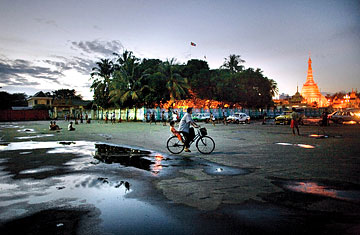
Wheels of history Rangoon's present shabbiness is a far cry from its Edwardian-era sophistication
When we're introduced to 11-year-old Bengali orphan Rajkumar Raha at the start of The Glass Palace (2000) — Amitav Ghosh's meticulously imagined historical novel set mostly in Burma — it's November 1885. Rajkumar is stranded in Mandalay as British troops storm the town, sending feckless King Thebaw into exile. It is Rajkumar's lurching misfortunes as an adult that ultimately give focus to this sprawling book — the wealth he spends a lifetime amassing as a timber magnate literally goes up in flames when Japanese planes bomb Rangoon in December 1941. But when we first meet him, he's a wide-eyed kid with nothing in the world but his wits, working at a baya gyaw (lentil fritter) stall opposite Mandalay Fort.
Rajkumar, it turns out, has been lured to Burma by a labor contractor's hype about a "golden land" where "no one ever starves." Nowadays, few go to Burma looking for meals (though for tourists, mohingya, a fish soup touted as Burma's national dish and among Rajkumar's favorites, is a peppery revelation). But the same cloying vision of an auriferous Burma that was so seductive to Rajkumar, and which Ghosh both celebrates and dismantles, still draws visitors. The very first billboard on the road from Yangon International Airport to the gridded core of downtown Rangoon sounds positively Keatsian: "Welcome to Myanmar, the Golden Land."
These days, of course, decrepitude reigns where was once a worldly entrepôt. Downtown, rows of colonnaded Edwardian hulks have fallen into soilure. Walking (carefully at night) along Rangoon's pitted sidewalks, it's hard to imagine a young and ambitious Rajkumar trading his airy green longyi for a stiff black suit and striding down the Strand to the old Chartered Bank, its anterooms thick with leather chairs and cigar smoke, to bid for a contract to supply timber for a railroad company. Equally surreal: that scrappy Mahabandoola Park was once Fytche Square, home to nightclubs and cabarets, and that the building diagonally across from the park's northeast corner was once the Rowe & Co. department store, one of Asia's premier emporiums. There, Rajkumar's son Dinu, a budding photographer, gets his first Brownie camera and Rajkumar's wife Dolly buys modish furniture for their newly built courtyard home.
The Glass Palace took Ghosh five years to write, during which he traveled extensively within Burma. In the book, the many conflicting incarnations of Burma's rumbustious chief city come equally alive. Shortly after Dinu recovers from a childhood bout of polio, Dolly has a religious awakening at Sule Pagoda, in downtown Rangoon's geographic center, rising "above the busy streets like a rock rearing out of the sea." But not long after, while driving by Sule with a friend in a 1929 Packard saloon, Dolly is witness to race riots, and watches as an Indian rickshaw puller is chased and beheaded right in front of her car. That's just a block, incidentally, from the spot where photojournalist Kenji Nagai was gunned down by a soldier during antigovernment protests in 2007.
In the final section of the novel, Rajkumar's granddaughter Jaya, a professor in Kolkata, flies to Rangoon in 1996 to find her long-lost uncle Dinu. He'd been arrested during the 1988 uprising but now runs a small portrait studio and hosts a weekly salon at his muggy apartment, its walls lined with cast-off books from foreign diplomats' garbage cans. Outside, Jaya sees a "deadened city." But at one of Dinu's gatherings, attended by a motley crew of barefooted monks seated next to generals' sons in Armani caps, she notices what keeps the city alive: Rangoonites' wondrous cosmopolitanism, their curiosity and their humor in the face of grinding privation.
The latter is a survival skill that all who live in the former Burmese capital draw upon constantly. On a visit to Rangoon last spring, I was told in perfect Queen's English by a pinched 70-something tea-shop owner, his mouth full of silver, that I looked like Rock Hudson. He then tore up my kyat and shared a little secret: "It's all rotten," he said. "The currency, everything, it's just a big practical joke." It shouldn't have surprised me, but it did.
